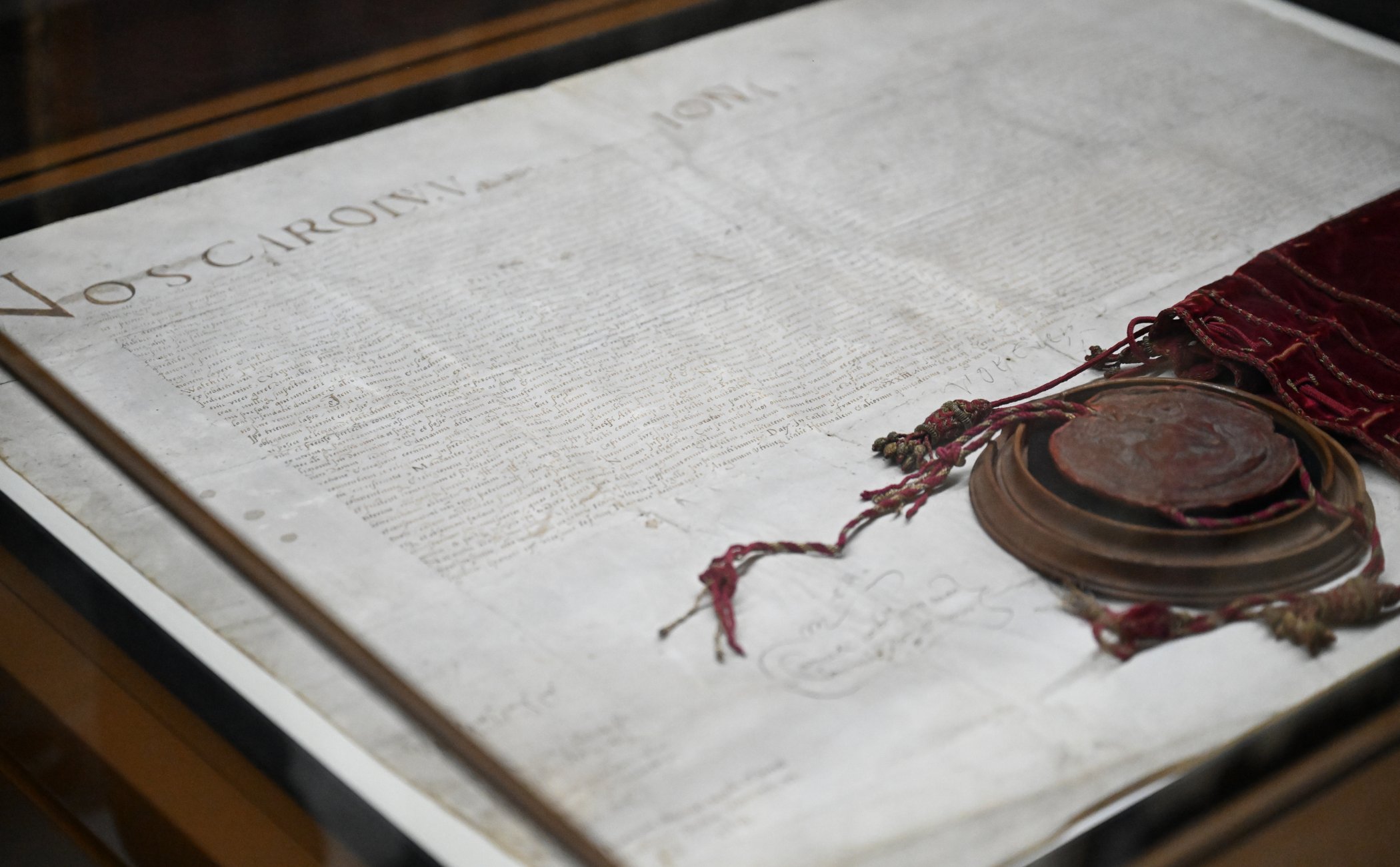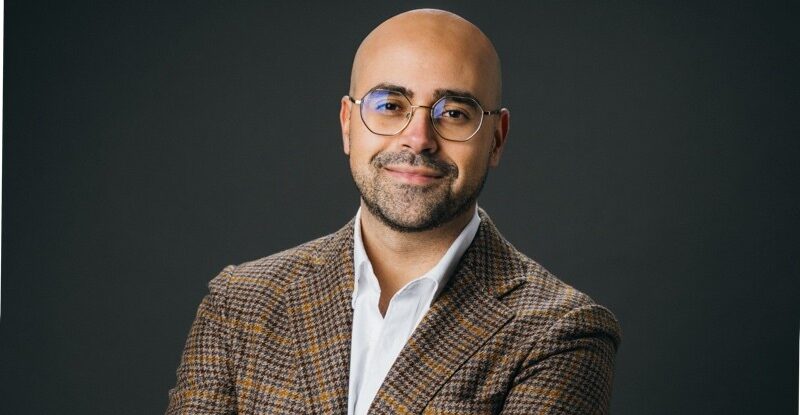The Embassy of the Kingdom of Spain, together with Bank of Valletta (BOV), Mapfre, Malta Libraries, Heritage Malta and the Order of Malta unveiled a newly crafted showcase, donated by BOV, to hold the historic “Deed of Donation” of the Maltese Islands, signed by Emperor Charles V in 1530.
This momentous document marks the pivotal moment when Malta was ceded to the Order of Saint John.
The ceremony, held in the Reading Room of the National Library of Malta, commemorates the 500th anniversary of Emperor Charles V’s decision to grant Malta to the Knights. This decision marked the beginning of Malta’s transformation into a distinct political entity, forever altering the archipelago’s destiny.
This unveiling is the beginning of a six-year project to celebrate the 500th anniversary of the Deed of Donation. With support from BOV, Mapfre, Heritage Malta, and the Order of Malta, events will include exhibitions, lectures, concerts, and symposia until 2030, fostering an enduring appreciation for Malta’s rich heritage and European roots.
The ceremony was presided over by the Minister for National Heritage, the Arts and Local Government Owen Bonnici, who stressed the importance of these initiatives, which not only preserve our country’s history, but also raise awareness of their significance at local and international level.
Minister Bonnici said that these activities, which commemorate historic events such as the donation of the Islands to the Knights of St John, help make Maltese heritage more appreciated and accessible to all, while further strengthening Malta’s cultural and historical identity.
Speaking during the ceremony Cheryl Falzon, National Librarian and CEO of Malta Libraries stated that “the shared vision of all the collaborating entities was to highlight the immense historical importance of this document while ensuring its long-term preservation.”
BOV Chairman Gordon Cordina expressed his pride in representing BOV on the special occasion in the unveiling of the newly crafted showcase that will now house this historic deed.
In his intervention, Ambassador José María Muriel said, “the Deed of donation is a landmark of the nations’ common history, not centuries but millennia old. This common project, which will extend from 2024 to 2030, and which will include concerts, talks and exhibitions, stems from our duty to safeguard and understand our shared past, present and future, celebrating it and aspiring to make it known”.
About the deed
Five hundred years ago, in 1524, the Knights of Saint John sent a delegation to Vitoria (Spain), where Emperor Charles V was conducting military operations. Just one year before, in 1523, the Knights had lost the island of Rhodes to the Ottoman Empire and decided to approach the Emperor who, “being the leader of the Christendom, and for the benefit of the Religion, may grant them land so that they can settle and reform the Order” (Salinas, 1523).
In 1524, Martin Salinas, Ambassador of Ferdinand of Hungary before Charles V, noted down the Emperor’s decision, while in Vitoria, in a recently discovered document: “H.M, having listened to their request and being of service to God, granted them said island [Malta], together with the city of Tripoli on the African coast”. The Emperor, says Salinas, did request consideration “that every year they are to deliver to H.M. a falcon”.
It will take quite some toing and froing: Delegations, on-site inspections, reports and letters from the Pope, for the Knights to finally accept the Islands of Malta and Gozo (together with the poisoned chalice of Tripoli), and for Emperor Charles V to sign, in 1530, the document known as the “Deed of Donation”.
As part of the Mediterranean dominions of the Crown of Aragon, within the orbit of the Kingdom of Sicily, the destiny of Malta had, until then, been tied to those of Sicily, Aragon and the Spanish Empire as whole. From that moment onwards, the foundations were laid for Malta to become a distinct political reality. The original “Deed of Donation” is one of the most significant documental treasures held at the National Library of Malta. It is written in Latin, on beautiful parchment of the best quality, and boasts the enormous wax seal of the Emperor.
Back in 2021, the Embassy of Spain, in coordination with the National Library, commissioned and financed an expert study on the state of conservation of the document, and, to mark the 500th anniversary of the 1524 political decision by the Emperor to bequeath the archipelago to the Knights, a state-of-the-art showcase was commissioned, sponsored by BOV.
This showcase will, from now on, house this important document which marks a pivotal moment in Malta’s history, providing optimal visibility to the public while ensuring the document’s preservation for generations to come.
The showcase was unveiled as part of a wider exhibition of selected documents showing, for the first time, a facsimile of the 1524 Salinas manuscript (reporting on the Emperor’s original decision and which has been made available by the Embassy of Spain), together with several other original documents held at the National Library that tell the story of how the Deed came into being: the Universitas’s discussion on the possibility of the Maltese islands being ceded to the Knights (Mdina, 10th April 1524); a copy of instructions given to the eight commissioners of the Order sent to inspect the islands (Viterbo, 28th June 1524); the letter by Pope Clement VII to Grand Master L’Isle Adam urging him to decide whether to accept Malta or not (Rome, 10th March 1526); and the letter of L’Isle Adam to Emperor Charles V informing of the decision to accept Malta, Gozo and Tripoli (Corneto, 10th July 1527).
Furthermore in 2024, Malta celebrated its 20th anniversary as a member of the EU. In this sense, Malta can be considered as the first testing ground of European unity. For nearly 300 years, Knights from every corner of Europe made Malta their home and became brothers.
They had their own languages and their own traditions, but what united them all was stronger than any of these differences. Those knights, irrespective of their origin, shared an overwhelming sense common purpose and an utmost regard for concepts such as Law and Justice. But, above all, they knew full well that they shared common cultural roots and values.
Karl Meli reflects after Gemini role affected by global restructuring
'Looking forward to what comes next.'
Mark Grech warns of sophisticated podcast scam after near-miss hack attempt
Scams are getting more sophisticated by the minute.
‘Progress doesn’t have to be perfect’: Abigail Agius Mamo shares winding road to Master’s degree
The former Chamber of SMEs CEO shared her story to remind people that progress doesn’t have to be linear and ...
Why emotional intelligence is becoming a core study skill and a future workforce advantage
Intelligence isn't being measured only by grades.









